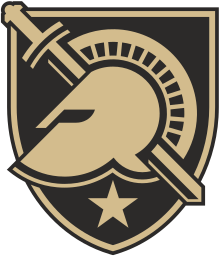John P. Riley Jr.
| IIHF Hall of Fame , 1998 | |
|---|---|
| Date of birth | June 15, 1920 |
| place of birth | Boston , Massachusetts , USA |
| date of death | 3rd February 2016 |
| Place of death | Sandwich , Massachusetts , USA |
| position | striker |
| Shot hand | Right |
| Career stations | |
| 1938-1939 | Tabor Academy |
|
1940-1942 1946-1947 |
Dartmouth College |
| 1947-1949 | US National Team |
| 1949-1950 | Boston Olympics |
John Patrick "Jack" Riley (born June 15, 1920 in Boston , Massachusetts , † February 3, 2016 in Sandwich , Massachusetts) was an American ice hockey player and coach. He was the coach of the United States' national ice hockey team when they won their first Olympic gold medal in 1960 .
Career
Jack Riley began his career with the Tabor Academy team. From 1940 to 1947 he played - interrupted by his service in the US Army during the Second World War - for the team at Dartmouth College in American university sports . After he was exclusively in the service of the US national team for the following two years , he let his career end with the Boston Olympics from the Eastern Hockey League in the 1949/50 season .
After the end of his active career, Riley was hired by the US Army in 1950 as a coach for the team at the United States Military Academy in West Point , the Army Black Knights men's . He worked there until he retired in 1986. In 1957 and 1960 he was awarded the Spencer Penrose Award for Best Division I Coach of the National Collegiate Athletic Association . In 1979 he was inducted into the United States Hockey Hall of Fame .
International
Jack Riley represented the USA for the first time at the 1948 Winter Olympics in St. Moritz , which was also the World Cup. A year later he was at the World Cup as a player-coach and won the bronze medal with the team behind Czechoslovakia and Canada .
For the 1960 Winter Olympics in Squaw Valley , he was appointed coach of the US selection. His team won the Olympic gold medal for the first time through successes against Canada (2: 1) and the Soviet Union (3: 2) that were as narrow as they were surprising . Since the Olympic tournament was also considered a world championship, the tournament victory was also associated with the second world championship title, the first one the US boys had won in 1933. In 2002 he was inducted into the IIHF Hall of Fame .
Achievements and Awards
- 1949 bronze medal at the world championship (as player-coach)
- 1957 Spencer Rose Award from the National Collegiate Athletic Association
- 1960 Spencer Rose Award from the National Collegiate Athletic Association
- 1960 Olympic champion and world champion at the Olympic Winter Games in Squaw Valley (as a trainer)
- 1979 inducted into the United States Hockey Hall of Fame
- 2002 induction into the IIHF Hall of Fame
Web links
- John P. Riley junior at eliteprospects.com (English)
- Obituary at www.iihf.com , accessed February 7, 2016
| personal data | |
|---|---|
| SURNAME | Riley, John P. Junior |
| ALTERNATIVE NAMES | Riley, John Patrick; Riley, Jack (nickname) |
| BRIEF DESCRIPTION | American ice hockey player and coach |
| DATE OF BIRTH | June 15, 1920 |
| PLACE OF BIRTH | Boston , Massachusetts |
| DATE OF DEATH | 3rd February 2016 |
| Place of death | Sandwich , Massachusetts |
